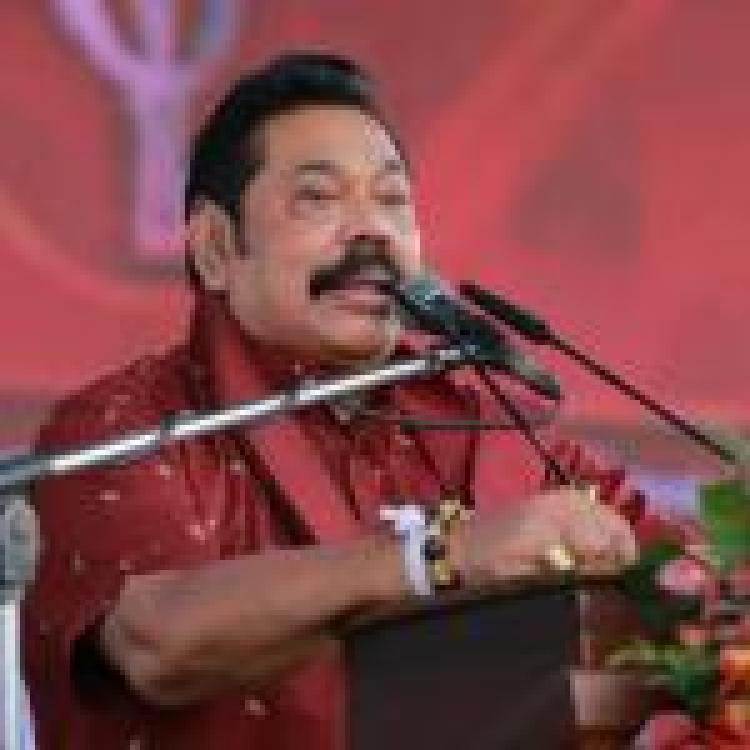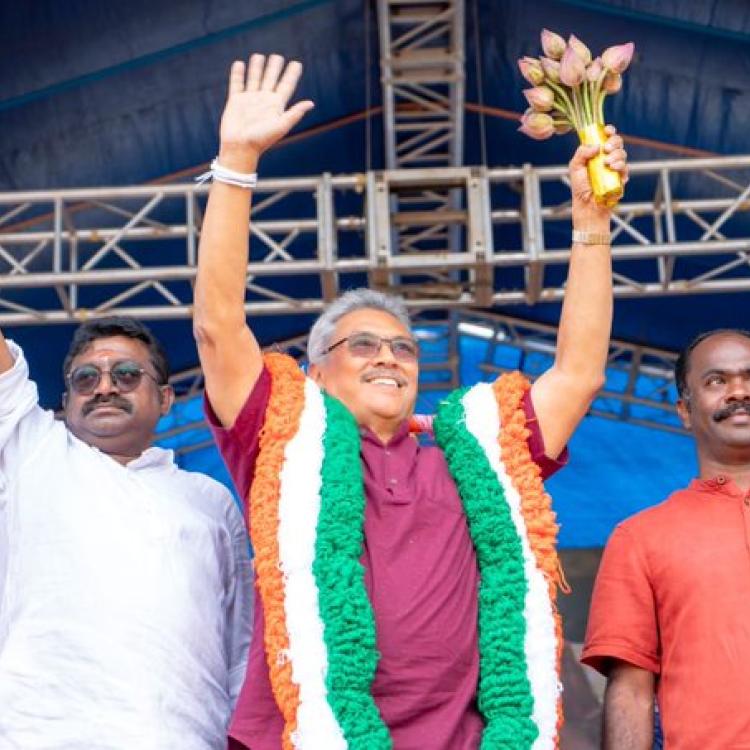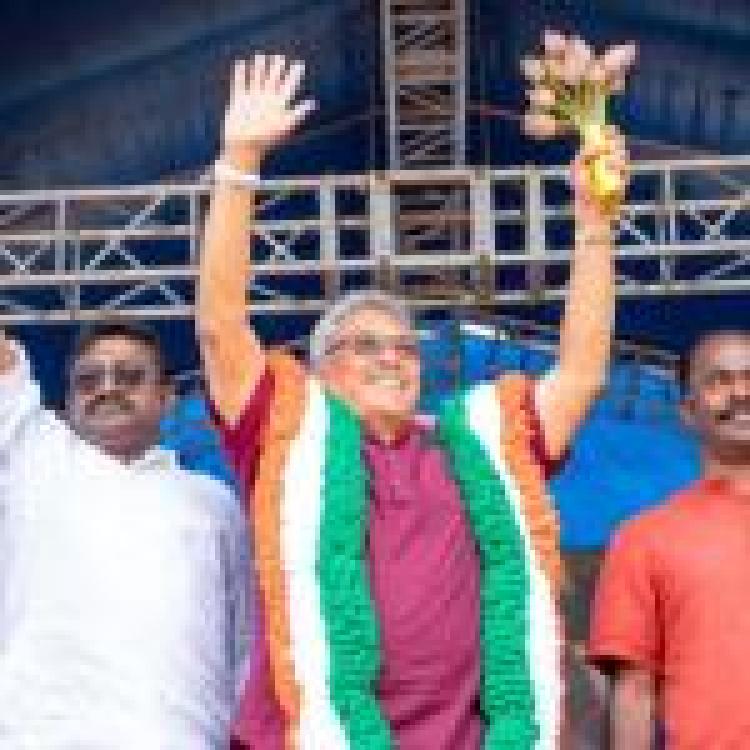The Sri Lankan presidential elections were watched closely by journalists and human rights observers around the world, with much being written and broadcast during the campaign period, and much more expected in the aftermath of the result.
The Telegraph today captured the fear which rippled through the Tamil North-East, which voted overwhelmingly against Rajapaksa, with record numbers coming out to deliver over 80% of the vote to Sajith Premadasa. Qadijah Irshad speaking to Tamils in the North writes:
As Mr Rajapaksa prepared to be sworn in as the island’s new president on Monday in the ancient kingdom of Anuradhapura, the minority communities in the North and East who voted for Mr Premadasa, said they were fearful for the future.
The usually vibrant northern city of Jaffna was eerily quiet on Sunday, with Tamils openly saying they were “scared.” “The elected president makes us uneasy. We don’t know what will happen. We expected Mr Premadasa to become president. This is the first time in history the Tamil people have voted for a Sinhalese candidate in such overwhelming numbers,” said Ramakrishnan, a 65 year old retired teacher from Jaffna.
[...]
“We are afraid of the repercussions now because we didn’t vote for the Rajapaksas,” said Anu, a government servant. “Our future will be tremendously affected.”
The Guardian led with the brutality that Rajapaksa has become known for, with Hannah Ellis-Petersen saying:
For the next four years, Mahinda and Gotabaya oversaw the brutal and bloody operation that ended the civil war but during which 40,000 are estimated to have died. It was during this time, as de facto head of the military, that Gotabaya allegedly authorised torture, rape, extrajudicial killings, abductions and disappearances of Tamil separatists, journalists and opponents, by his own government-endorsed “death squads”. Gotabaya has denied all the charges.
There has never been any accountability for the tens of thousands of disappearances that occurred in the final throes of the war.
The Guardian: 'The Terminator': how Gotabaya Rajapaksa's ruthless streak led him to power
Similarly, in a piece for NPR which days earlier published a feature on Tamil mothers of the disappeared, Kat Lonsdorf writes:
But for many in Sri Lanka's ethnic minorities, moving on is not an option. Ahead of this weekend's election, NPR's Lauren Frayer talked to several Tamil mothers whose children are still missing after security forces led by Rajapaksa took them away before the end of the civil war more than a decade ago. Tens of thousands of people disappeared during the 26-year civil war, and more than 100,000 people died. No one has ever been held accountable for the extrajudicial killings, although many in the minority groups hold Rajapaksa responsible, and fear what Sri Lanka will become under his rule.
NPR: Gotabaya Rajapaksa Wins Sri Lankan Presidential Elections
In The Hindu, Meera Srinivasan also briefly addresses the staggering difference between the Sinhala vote and Tamil and Muslim vote stating:
For Tamils, Mr. Rajapaksa’s former avatar brings back disturbing memories of stifling military surveillance and many enforced disappearances — for which families are still seeking answers. The brutal finish to the war with the Tamil Tigers in 2009, took away lives of tens of thousands of civilians and the wounds have hardly healed in the last decade.
The Hindu: Sri Lanka polls - How did the minorities vote, and why?
While establishment US and India media placed particular focus on concerns around the Rajapaksa's, The Hindu editorial summarised the failures of the previous 'unity' government of Maithripala Sirisena and Ranil Wickremesinghe:
A mandate for reform and progress has been frittered away. Those blamed for the past democratic deficit are back in power. The country is nowhere near the promised constitutional reforms, either to address minority concerns or to abolish the executive presidency.
The Hindu: Back to the Rajapaksas - On Gotabaya Rajapaksa's victory
Bloomberg also makes mention of the fears around the return of a Rajapaksa presidency, as Ruth Pollard writes:
Gotabhaya was defense minister during his brother Mahinda Rajapaksa’s 10-year-rule, when Tamil politicians were murdered, thousands of Sri Lankans were forcibly disappeared and dozens of journalists were killed or forced into exile.
Bloomberg: A Strongman Returns to Sri Lanka, Raising Fears of Tilt to China
Meanwhile, Sri Lankan media largely hailed Rajapaksa's victory while making token mentions of the ethnic divide in the vote with perfunctory calls for healing, reconciliation and unity. The Island in its editorial slammed the UNP's reliance on Tamil and Muslim - "others" - votes and emphasised the prevailing narrative amongst the Sinhala commentariat that endorsements of the Tamil National Alliance, and to a lesser extent the All Ceylon Muslim Congress, cost Premadasa the Sinhala vote bloc:
The TNA helped Sajith bag the North and the East, but the political backlash triggered by its 13 demands cost him a large number of votes in the other parts of the country. The same goes for the ACMC’s backing for him. Rishad Bathiudeen’s presence on his platform may have helped Sajith secure a considerable number of votes in Mannar, etc., but it alienated a large number of voters elsewhere. He lost his own electorate, Tissamaharama by 48,000 votes while scoring impressive wins in the North and the East! It is time the UNP stopped depending on others’ block votes to win elections.
More to follow.



